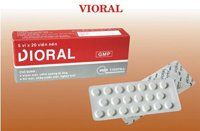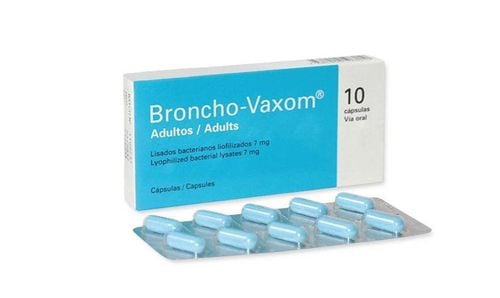This is an automatically translated article.
Cenafed medicine has the active ingredient pseudoephedrine, which is used in the treatment of nasal congestion symptoms of the flu. Please read the following article to learn more about this drug.
1. What is Cenafed?
What is Cenafed drug? Cenafed (Oral) medicine contains pseudoephedrine (to be taken orally). In addition to the main ingredient, the drug also contains brand-name drugs such as Biofed, Cenafed, Efidac 24 Pseudoephedrine, ...
Cenafed medicine can be prepared in the form of: solution, Soft capsule, Syrup, tablets, mixture Translate.
2. Uses of the drug Cenafed
Cenafed medicine has an effect on the sympathetic nervous system, leading to the effect of decongesting and reducing nasal congestion. Cenafed is indicated for the relief of nasal or sinus congestion caused by the common cold, sinusitis and pollen allergies and other respiratory allergies. Cenafed is also used to relieve tinnitus caused by an ear infection or infection.3. How to use and dose of Cenafed
The following is the dosage and general administration information for Pseudoephedrine-containing medicines:
For patients taking pseudoephedrine extended-release capsules: The patient should swallow the capsule whole. Do not chew or split the tablet before swallowing. For patients taking pseudoephedrine extended-release tablets: Swallow the tablet whole and do not break, crush, or chew the tablet before swallowing. To help prevent sleep disturbances, take the last dose of pseudoephedrine of the day a few hours before bedtime.
Take pseudoephedrine only as directed. Do not take more doses, more often, and for longer than recommended on the label (usually 7 days) unless directed by your doctor.
Dosage of pseudoephedrine:
Dosage of pseudoephedrine varies from person to person, so follow your doctor's prescription or instructions on the label. The average reference dose of pseudoephedrine is as follows:
For nasal or sinus congestion
For the usual oral dosage form (capsule, oral solution, syrup or tablet):
Adults and children 12 years of age and older: , 60mg dose every 4 to 6 hours, do not take more than 240 mg of pseudoephedrine in 24 hours. Children 6 to 12 years old, 30mg dose every 4 to 6 hours. Do not take more than 120 mg of pseudoephedrine in 24 hours. Children 4 to 6 years old 15 mg every 4 to 6 hours. Do not take more than 60 mg of pseudoephedrine in 24 hours. Infants and children under 4 years old: not recommended for this audience. For the long-acting oral formulation (capsule or extended-release tablet):
Adults and children 12 years of age and older: 120 mg pseudoephedrine every 12 hours, or 240 mg every 24 hours. Do not take more than 240 mg of pseudoephedrine in 24 hours. Infants and children under 12 years of age: the use of pseudoephedrine is not recommended in this population. What should we do if we miss a dose?
If you miss a dose of Cenafed, take it as soon as you remember. However, if it's almost time for your next dose, skip the missed dose and go back to your regular dosing schedule.
4. Interactions of Cenafed with other drugs or food
Cenafed drug interacts with the following drugs, so it is not recommended to use it together: Dihydroergotamine, Furazolidone, Iproniazid, Isocarboxazid, Linezolid, Methylene Blue, Coclobemide, Nialamide, Phenelzine, Procarbazine, Rasagiline, Safinamide, Selegiline, Tranylcypromine.
Using Cenafed with any of the following medicines is generally not recommended, but may be required in some cases. If it is necessary to use 2 drugs, the doctor may change the dose or frequency of use of one or both drugs: Guanethidine, Iobenguane I 131, Iobenguane I 123, Methyldopa, Midodrine.
Drug interactions Cenafed with food / tobacco / alcohol: Using alcohol or tobacco with some drugs can also cause interactions, increase or decrease drug effects.
In order to avoid drug interactions, patients need to inform their doctors about the drugs, herbs, and supplements they are using so that the doctor can consider and prescribe appropriate drugs.
5. Side effects when using Cenafed
Some unwanted effects that can occur when using Cenafed medicine that require medical intervention:
Rare effects:
More common when used in high doses: Convulsions (convulsions), hallucinations (seeing, hearing, or feeling things that aren't there), irregular or slow heartbeat, trouble breathing Drug overdose symptoms: Convulsions (convulsions), rapid breathing, hallucinations (seeing, hearing, or feeling) seeing things that aren't there), increased blood pressure, irregular heartbeat (continued), Shortness of breath (severe or continuing), slow or fast heart rate (severe or continuing), unusual nervousness, restlessness , or excitement Some side effects from using Cenafed can occur that usually do not require medical attention. These side effects may go away during treatment as the patient's body adjusts to the medication. See your doctor for advice if any of the following side effects persist or cause discomfort or if you have any questions about them:
More common: Nervousness, trouble sleeping Less common: Difficult or painful urination, dizziness, fast heartbeat, headache, increased sweating, nausea or vomiting, tremors, unusual paleness, weakness. When experiencing serious unwanted effects, call an ambulance or take the patient to the nearest medical facility for timely treatment.
6. Notes when using Cenafed
Before appointing a patient to use the drug, the doctor will weigh the benefits and harms of the drug to the patient, based on the following factors:
Allergies: The patient needs to inform the doctor if have ever had any unusual or allergic reaction to medicines containing pseudoephedrine or any other medicines, foods, or agents. Pediatrics: Pseudoephedrine may cause side effects in children, especially infants, and premature birth more than in older children and adults. Do not give any over-the-counter (OTC) cold medicine to an infant or child under 4 years of age. The use of these drugs in young children can cause serious or possibly life-threatening side effects. Geriatrics: Drugs have not been specifically studied in older people, so it may not be known if they work the same way they work in younger people. There is no specific information comparing use of pseudoephedrine in the elderly with use in other age groups. Lactation: Studies have shown that pseudoephedrine poses a minimal risk to the infant when used during breast-feeding. Other medical problems Other medical problems may affect the use of Cenafed medicine. Patients should tell their treating doctor if they have any other medical problems, especially:
Using pseudoephedrine in people with type 2 diabetes may cause hyperglycemia. Enlarged prostate. Glaucoma, or people with a predisposition to glaucoma. Heart or blood vessel disease. Pseudoephedrine may make high blood pressure worse. Using pseudoephedrine in people with overactive thyroid problems might make the condition worse. Caution: If symptoms do not improve within 7 days of taking the medicine or if you develop a high fever, tell your doctor for proper diagnosis and treatment.
Storage: Store the medicine in an airtight container in a dry place, at room temperature, away from direct light. Do not let the medicine freeze. Cenafed medicine has the active ingredient pseudoephedrine, which is used in the treatment of nasal congestion symptoms of the flu. To ensure effective use, users need to strictly follow the instructions of the doctor or pharmacist.
Follow Vinmec International General Hospital website to get more health, nutrition and beauty information to protect the health of yourself and your loved ones in your family.
Reference source: .drugs.com













